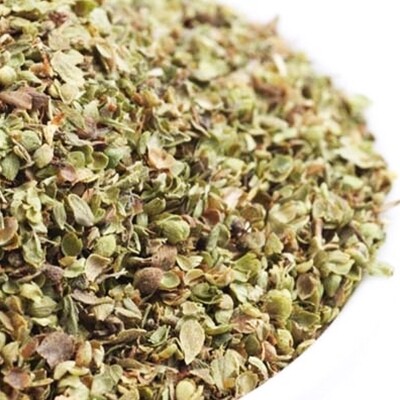
Greek Oregano
Oregano is a robust herb that is both complex and strongly aromatic- its scent is described as a bit camphoraceous. There are so many plants called oregano that some have suggested that oregano be considered a flavor rather than a specific species. Nonetheless, in most kitchens there are two types of oregano that are the most often used – the more popular is Origanum vulgare which is a member of the Lamiaceae family (mint) and is commonly known as Mediterranean oregano, true oregano, or Greek oregano. The other is Lippia graveolens, or Mexican oregano, a member of the Verbenaceae family.
Mediterranean Oregano is closely related to marjoram and is similar in taste. In fact, oregano means marjoram in Spanish and so the two are often confused in recipes written in Spanish. Oregano grows throughout Europe and Asia, Greece, Turkey, Egypt and here in the US in both California and New Mexico.
Mediterranean Oregano has an essential oil with a color that ranges from yellowish red to a dark brown. The essential oil is about 1.0% to 2%
In Mediterranean and Italian cooking, oregano is a key ingredient and when partnered with basil, the two form an unbeatable combination in pasta, on roasted vegetables, and most definitely in pizza sauce. The herb is also widely used in Egyptian, Greek, Italian, Lebanese, Palestinian, Portuguese, Philippine, Spanish, Syrian and Turkish cuisines. In Turkish cooking, oregano is primarily used to flavor meat, most notably lamb and mutton. In popular Turkish barbecue and kebab restaurants, it is often found on the table, alongside paprika, pepper and salt.
This herb can easily become an addition to your regular chili recipe. When cooking chili, just before you are ready to serve, add in a few sprigs to liven up the flavor of the tomato sauce.
If you want to liven up your olive oil, mix some oregano into it and use it as a marinade for a variety of meats on the grill. This marinade is also useful for vegetables, and you can add some fresh lemon juice to this olive oil mixture for a light tasting addition to a fish-based meal.
If any recipe calls for Greek, Italian or Spanish oregano, this Turkish Oregano can be substituted. If your recipe calls for Mexican oregano, this will provide a very different flavor profile.
Use Mediterranean Oregano with cream sauces, vinegars, salad dressings, soups, and herb butters. It's also outstanding in egg and cheese dishes (such as omelets, frittatas, and quiches). Combine olive oil with oregano and brush on foods for the grill. It is also commonly mixed with other herbs and spices for a salt-free seasoning.
About Us

David Humphrey
Chef/Owner
In September of 2019 our Chef/Owner, David Humphrey, started A&H Provisions to help bring a local option for spices to the Atlanta, Georgia area. An option that will give local residents the ability to have a spice merchant help them make the right choices when purchasing their spices. We will source our product so as to provide you with freshest product possible.
Chef David has been in the culinary industry for over 25 years. His first job was at Six Flags Great America in Gurnee, Illinois. After that he was hooked on the industry. He would continue to work with food whether it was in the back or front of house, in positions from entry level to managerial. In 2010, Chef David enrolled in culinary school at Le Cordon Bleu College of Culinary Arts Chicago and then graduated in March of 2012 with an Associates Degree in Culinary Arts. He then began working at fine dining restaurants in Chicago, amongst them were, Bistro Bordeaux, Fork and A10. In 2016, He moved to Lawrenceville, Georgia and began working at restaurants there, then eventually switched over to Private Chef work before starting A&H Provisions.
At A&H Provisions, we have the belief that making great food starts with a solid FOUNDATION. Our spices provide that foundation for ultimate FLAVOR, which will give you the greatest tasting FOOD for you and your family.
